2008 年完形填空汇总答案
2008年普通高等学校招生全国统一考试英语完形填空以及答案详细解析(19套试题)
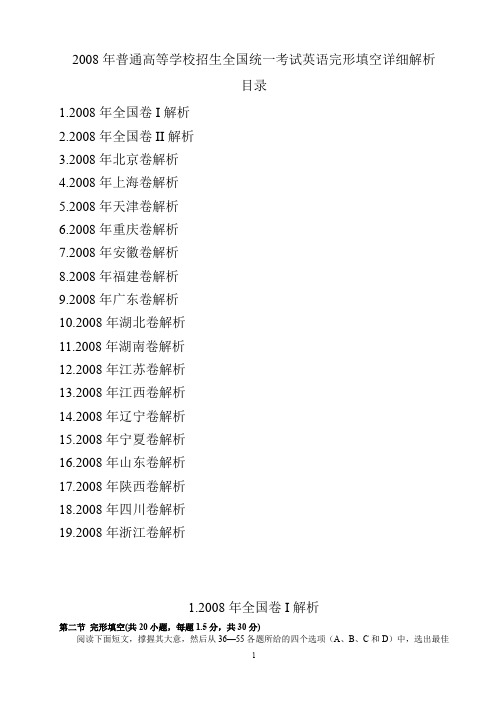
2008年普通高等学校招生全国统一考试英语完形填空详细解析目录1.2008年全国卷I解析2.2008年全国卷II解析3.2008年北京卷解析4.2008年上海卷解析5.2008年天津卷解析6.2008年重庆卷解析7.2008年安徽卷解析8.2008年福建卷解析9.2008年广东卷解析10.2008年湖北卷解析11.2008年湖南卷解析12.2008年江苏卷解析13.2008年江西卷解析14.2008年辽宁卷解析15.2008年宁夏卷解析16.2008年山东卷解析17.2008年陕西卷解析18.2008年四川卷解析19.2008年浙江卷解析1.2008年全国卷I解析第二节完形填空(共20小题,每题1.5分,共30分)阅读下面短文,撑握其大意,然后从36—55各题所给的四个选项(A、B、C和D)中,选出最佳选项,并在答题卡上将该项涂黑。
After the birth of my second child, I got a job at a restaurant. Having worked with an experienced 36 for a few days, I was 37 to wait tables on my own. All went 38 that first week. When Saturday night came, I was luckily 39 the tables not far from the kitchen. 40 , I still felt a little hard to carry the heavy trays (托盘)。
Before I knew it, the 41 was full of people. I moved slowly, 42 every step. I remember how 43 I was when I saw the tray stand near the tables, it looked different from the one I was 44 on. It had nice handles (手柄),which made it 45 to move around. I was pleased with everything and began to 46 I was a natural at this job.Then, an old man came to me and said, “Excuse me, dear, my wife and I loved __47 you work. It seems your tray stand has been very 48 to you, but we are getting ready to 49 now, and my wife needs her 50 back.”At first his 51 did not get across. “What was he talking about!” Then I got it. I had set my trays on his wi fe’s orthopedic walker (助步器). I stood frozen as ice, but my face was 52 . I wanted to get into a hole and 53 .Since then, I have learned from many mistakes such as the one I just 54 , I have learned to be more 55 and not to be too sure of myself.36. A. manager B. assistant C. cook D. waitress【答案】D。
2008 年完形填空汇总答案
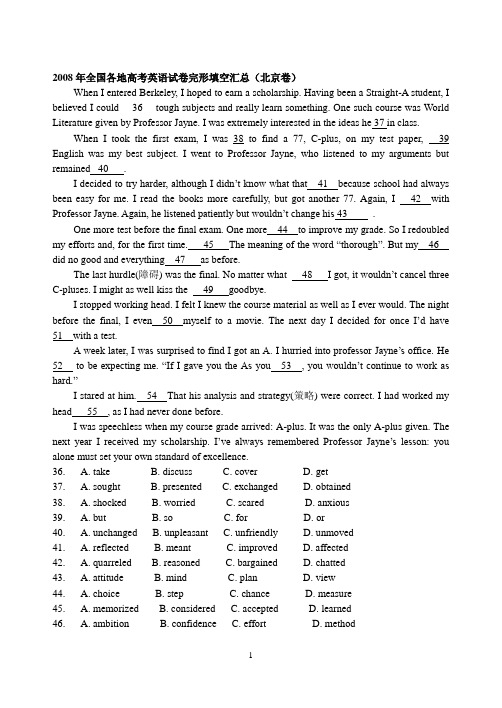
2008年全国各地高考英语试卷完形填空汇总(北京卷)When I entered Berkeley, I hoped to earn a scholarship. Having been a Straight-A student, I believed I could __36__ tough subjects and really learn something. One such course was World Literature given by Professor Jayne. I was extremely interested in the ideas he 37 in class.When I took the first exam, I was 38 to find a 77, C-plus, on my test paper, 39 English was my best subject. I went to Professor Jayne, who listened to my arguments but remained_ 40 .I decided to try harder, although I didn‟t know what that41 because school had always been easy for me. I read the books more carefully, but got another 77. Again, I 42 with Professor Jayne. Again, he listened patiently but wouldn‟t change his 43 .One more test before the final exam. One more 44 to improve my grade. So I redoubled my efforts and, for the first time. 45 The meaning of the word “thorough”. But my46__ did no good and everything 47 as before.The last hurdle(障碍) was the final. No matter what 48 I got, it wouldn‟t cancel three C-pluses. I might as well kiss the 49 goodbye.I stopped working head. I felt I knew the course material as well as I ever would. The night before the final, I even 50 myself to a movie. The next day I dec ided for once I‟d have 51__with a test.A week later, I was surprised to find I got an A. I hurried into professor Jayne‟s office. He 52__ to be expecting me. “If I gave you the As you53 , you wouldn‟t continue to work as hard.”I stared at him. 54 That his analysis and strategy(策略) were correct. I had worked my head 55 , as I had never done before.I was speechless when my course grade arrived: A-plus. It was the only A-plus given. The next year I received my scholarship. I‟ve always remembered Professor Jayne‟s lesson: you alone must set your own standard of excellence.36. A. take B. discuss C. cover D. get37. A. sought B. presented C. exchanged D. obtained38. A. shocked B. worried C. scared D. anxious39. A. but B. so C. for D. or40. A. unchanged B. unpleasant C. unfriendly D. unmoved41. A. reflected B. meant C. improved D. affected42. A. quarreled B. reasoned C. bargained D. chatted43. A. attitude B. mind C. plan D. view44. A. choice B. step C. chance D. measure45. A. memorized B. considered C. accepted D. learned46. A. ambition B. confidence C. effort D. method47. A. stayed B. went C. worked D. changed48. A. grade B. answer C. lesson D. comment49. A. scholarship B. course C. degree D. subject50. A. helped B. favored C. treated D. relaxed51. A. fun B. luck C. problems D. tricks.52. A. happened B. proved C. pretended D. seemed53. A. valued B. imagined C. expected D. welcomed54. A. remembering B. guessing C. supposing D. realizing55. A. out B. over C. on D. Off答案:36. A 37. B 38. A 39. C 40. D41. B 42. B 43. B 44. C 45. D46. C 47. B 48. A 49. A 50. C51. A 52. D 53. C 54. D 55. D(安徽卷)第二节完形填空(共20小题;每小题1.5分,满分30分)阅读下面短文,从短文后各题所给的四个选项(A、B、C、D)中,选出可以填入空白处的最佳选项,并在答题卡上将该项涂黑。
08考研英语完形填空标准答案

在刚结束的英语考试中,试卷开头的英语能⼒应⽤(即⼴⼤考⽣通常称为完形填空)考察了⼀篇关于⼈类智能的⽂章,通过笔者在络上的搜索,发现该⽂原⽂刊登在2005年6⽉2⽇的《经济学⼈》杂志上。
命题专家对原⽂进⾏了⼀定的简化,但是意思没有发⽣丝毫的变化。
经过简单的⽐对,笔者做了⼀份答案,相信应该是标准答案了。
The evolution of intelligence Jun 2nd 2005 Greg Cochran THE idea that some ethnic groups may, on average, be more intelligent than others is one of those hypotheses that dare not speak its name. But Gregory Cochran, (a noted scientific iconoclast), is prepared 第1题答案为B to say it anyway. He is that rare 第2题答案为D bird, a scientist who works independently of 第3题答案为A any institution. He helped popularise the idea that some diseases not previously 第4题答案为C thought to have a bacterial cause were actually infections, which ruffled many scientific feathers when it was first suggested. And more controversially still, he has suggested that homosexuality is caused by an infection. Even 第5题答案为C he, however, might tremble at the thought第6题答案为A of what he is about to do. Together with Jason Hardy and Henry Harpending, of the University of Utah, he is publishing, in a forthcoming edition of the Journal of Biosocial Science, a paper which not only suggests第7题答案为B that one group of humanity is more intelligent than the others, but explains the process that has brought this about. The group in question 第8题答案为D are Ashkenazi Jews. The process is natural selection. Ashkenazim generally do well in IQ tests, scoring 第9题答案为B 12-15 points above the mean 第10题答案为C value of 100, and have contributed disproportionately 第11题答案为B to the intellectual and cultural life of the West, as the careers 第12题答案为D of Freud, Einstein and Mahler, pictured above, affirm 第13题答案为A. They also suffer more often than most people from a number of nasty genetic diseases, such as Tay-Sachs and breast cancer. These facts, however 第14题答案为C, have previously been thought unrelated. The former has been put down 第15题答案为D to social effects, such as a strong tradition of valuing 第16题答案为D education. The latter was seen as a consequence 第17题答案为C of genetic isolation. Even now, Ashkenazim tend to marry among themselves. In the past they did so almost exclusively. Dr Cochran, however, suspects that the intelligence and the diseases are intimately linked 第18题答案为A. His argument is that the unusual history of the Ashkenazim has subjected 第19题答案为B them to unique evolutionary pressures that have resulted in this paradoxical 第20题答案为A state of affairs.。
2008年全国考研英语完形填空之答案详解.doc

2008年考研英语真题——完型填空Section I Use of EnglishDirections:Read the following text. Choose the best word(s) for each numbered blank and mark A, B, C or D on ANSWER SHEET 1. (10 points)The idea that some groups of people may be more intelligent than others is one of those hypotheses that dare not speak its name. But Gregory Cochran is 1 to say it anyway. He is that 2 bird, a scientist who works independently 3 any institution. He helped popularize the idea that some diseases not 4 thought to have a bacterial cause were actually infections, which aroused much controversy when it was first suggested.5 he, however, might tremble at the 6 of what he is about to do. Together with another two scientists, he is publishing a paper which not only 7 that one group of humanity is more intelligent than the others, but explains the process that has brought this about. The group in 8 are a particular people originated from central Europe. The process is natural selection.This group generally do well in IQ test, 9 12-15 points above the 10 value of 100, and have contributed 11 to the intellectual and cultural life of the West, as the 12 of their elites, including several world-renowned scientists,13 hey also suffer more often than most people from a number of nasty genetic diseases, such as breast cancer. These facts, 14 ave previously been thought unrelated. The former has been 15 social effects, such as a strong tradition of 16 ucation. The latter was seen as a (an) 17 genetic isolation. Dr. Cochran suggests that the intelligence and diseases are intimately18 is argument is that the unusual history of these people has 19 em to unique evolutionary pressures that have resulted in this 20 ate of affairs.1. [A] selected [B] prepared [C] obliged [D] pleased2. [A] unique [B] particular [C] special [D] rare3. [A] of [B] with [C] in [D] against4. [A] subsequently [B] presently [C] previously [D] lately5. [A] Only [B] So [C] Even [D] Hence6. [A] thought [B] sight [C] cost [D] risk7. [A] advises [B] suggests [C] protests [D] objects8. [A] progress [B] fact [C] need [D] question9. [A] attaining [B] scoring [C] reaching [D] calculating10. [A] normal [B] common [C] mean [D] total11. [A] unconsciously [B] disproportionately[C] indefinitely [D] unaccountably12. [A] missions [B] fortunes [C] interests [D] careers13. [A] affirm [B] witness [C] observe [D] approve14. [A] moreover [B] therefore [C] however [D] meanwhile15. [A] given up [B] got over [C] carried on [D] put down16. [A] assessing [B] supervising [C] administering [D] valuing17. [A] development [B] origin [C] consequence [D] instrument18. [A] linked [B] integrated [C] woven [D] combined19. [A] limited [B] subjected [C] converted [D] directed20. [A] paradoxical [B] incompatible [C] inevitable [D] continuous解析:本题测试语义逻辑衔接。
2008年完形答案
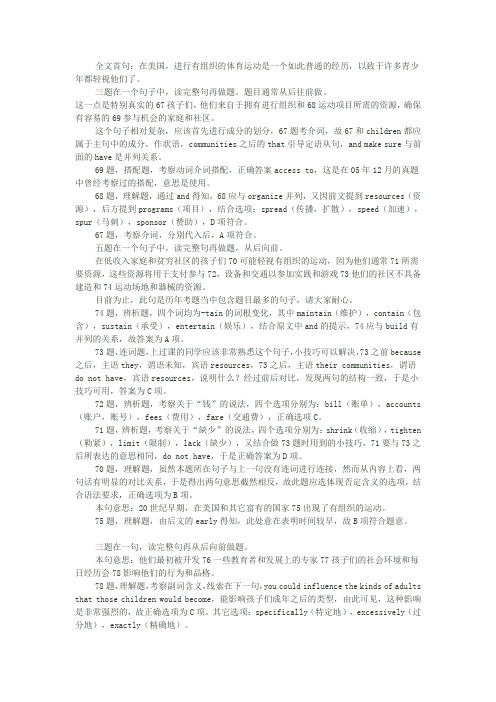
全文首句:在美国,进行有组织的体育运动是一个如此普通的经历,以致于许多青少年都轻视他们了。
三题在一个句子中,读完整句再做题。
题目通常从后往前做。
这一点是特别真实的67孩子们,他们来自于拥有进行组织和68运动项目所需的资源,确保有容易的69参与机会的家庭和社区。
这个句子相对复杂,应该首先进行成分的划分,67题考介词,故67和children都应属于主句中的成分,作状语,communities之后的that引导定语从句,and make sure与前面的have是并列关系。
69题,搭配题,考察动词介词搭配,正确答案access to,这是在05年12月的真题中曾经考察过的搭配,意思是使用。
68题,理解题,通过and得知,68应与organize并列,又因前文提到resources(资源),后方提到programs(项目),结合选项:spread(传播,扩散),speed(加速),spur(马刺),sponsor(赞助),D项符合。
67题,考察介词,分别代入后,A项符合。
五题在一个句子中,读完整句再做题,从后向前。
在低收入家庭和贫穷社区的孩子们70可能轻视有组织的运动,因为他们通常71所需要资源,这些资源将用于支付参与72,设备和交通以参加实践和游戏73他们的社区不具备建造和74运动场地和器械的资源。
目前为止,此句是历年考题当中包含题目最多的句子,请大家耐心。
74题,辨析题,四个词均为-tain的词根变化,其中maintain(维护),contain(包含),sustain(承受),entertain(娱乐),结合原文中and的提示,74应与build有并列的关系,故答案为A项。
73题,连词题,上过课的同学应该非常熟悉这个句子,小技巧可以解决,73之前because 之后,主语they,谓语未知,宾语resources,73之后,主语their communities,谓语do not have,宾语resources,说明什么?经过前后对比,发现两句的结构一致,于是小技巧可用,答案为C项。
2008初中英语完形填空10篇(含答案)
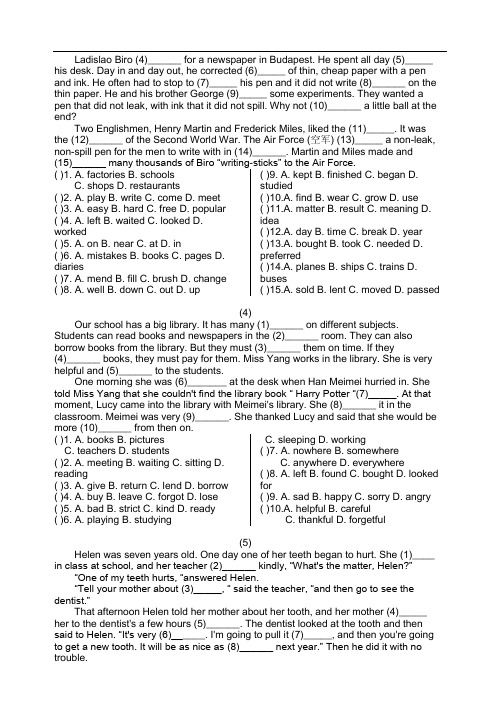
Ladislao Biro (4)______ for a newspaper in Budapest. He spent all day (5)_____ his desk. Day in and day out, he corrected (6)_____ of thin, cheap paper with a pen and ink. He often had to stop to (7)_____ his pen and it did not write (8)______ on the thin paper. He and his brother George (9)_____ some experiments. They wanted a pen that did not leak, with ink that it did not spill. Why not (10)______ a little ball at the end?Two Englishmen, Henry Martin and Frederick Miles, liked the (11)_____. It was the (12)______ of the Second World War. The Air Force (空军) (13)_____ a non-leak, non-spill pen for the men to write with in (14)______. Martin and Miles made and (15)______ many thousands of Biro “writing-sticks” to the Air Force.( )1. A. factories B. schoolsC. shopsD. restaurants( )2. A. play B. write C. come D. meet ( )3. A. easy B. hard C. free D. popular ( )4. A. left B. waited C. looked D. worked( )5. A. on B. near C. at D. in( )6. A. mistakes B. books C. pages D. diaries( )7. A. mend B. fill C. brush D. change ( )8. A. well B. down C. out D. up( )9. A. kept B. finished C. began D.studied( )10.A. find B. wear C. grow D. use( )11.A. matter B. result C. meaning D.idea( )12.A. day B. time C. break D. year( )13.A. bought B. took C. needed D.preferred( )14.A. planes B. ships C. trains D.buses( )15.A. sold B. lent C. moved D. passed (4)Our school has a big library. It has many (1)______ on different subjects. Students can read books and newspapers in the (2)______ room. They can also borrow books from the library. But they must (3)______ them on time. If they(4)______ books, they must pay for them. Miss Yang works in the library. She is very helpful and (5)______ to the students.One morning she was (6)_______ at the desk when Han Meimei hurried in. She told Miss Yang that she couldn't find the library book “ Harry Potter “(7)_____. At that moment, Lucy came into the library with Meimei's library. She (8)______ it in the classroom. Meimei was very (9)______. She thanked Lucy and said that she would be more (10)______ from then on.( )1. A. books B. picturesC. teachersD. students( )2. A. meeting B. waiting C. sitting D. reading( )3. A. give B. return C. lend D. borrow ( )4. A. buy B. leave C. forgot D. lose ( )5. A. bad B. strict C. kind D. ready ( )6. A. playing B. studyingC. sleepingD. working( )7. A. nowhere B. somewhereC. anywhereD. everywhere( )8. A. left B. found C. bought D. lookedfor( )9. A. sad B. happy C. sorry D. angry( )10.A. helpful B. carefulC. thankfulD. forgetful(5)Helen was seven years old. One day one of her teeth began to hurt. She (1)____ in class at school, and her teacher (2)______ kindly, “What's the matter, Helen?”“One of my teeth hurts, “answered Helen.“Tell your mother about (3)_____, “ said the teacher, “and then go to see the dentist.”That afternoon Helen told her mother about her tooth, and her mother (4)_____ her to the dentist's a few hours (5)______. The dentist looked at the tooth and then said to Helen. “It's very (6)______. I'm going to pull it (7)_____, and then you're going to get a new tooth. It will be as nice as (8)______ next year.” Then he did it with no trouble.The next day Helen's teacher asked her about the tooth. She said to her, “Does it (9)______ hurt, H elen?”“I don't know. You'd better ask the dentist, “Helen answered.“Why?” the teacher asked.“Because the dentist has (10)______ it, “ Helen answered.( )1. A. cried B. talked C. shouted D. laughed( )2. A. spoke B. told C. shouted D. asked( )3. A. her B. him C. it D. them ( )4. A. brought B. took C. put D. got ( )5. A. only B. ago C. later D. before( )6. A. hurt B. well C. healthy D. bad( )7. A. on B. in C. out D. off( )8. A. the other B. the oneC. anotherD. the others( )9. A. much B. very C. still D. also( )10.A. kept B. pulled C. done D. thrown (6)Many years ago, a man (1)____Wu taught King Wang how to ride horses and how to drive a chariot (马拉战车). (2)_____ some time the king started to race against Wu. But no matter how many (3)______ the king raced against Wu, Wu always won.The king was (4)_______ and said to Wu, “You have taught me how to ride and how to drive a chariot. But I don't think you have taught me everything about(5)______.”“I have taught you (6)______ I know,” (7)______ Wu. “But you have not learned everything. The (8)______ thing about driving a chariot is to think of the horses. The driver of the chariot and the horse should work together. You can then go very(9)______ and drive for long distance, but your problem is this: When you are behind me, you want to (10)_____ with me. And when you are (11)_____ me, you are afraid that I will catch up with you. (12)_____ whether you are in front of me or behind me, you are thinking of me. You are not thinking of your (13)______. If you want to win, you must (14)______ thinking of me, you (15)______ think only of your horse.”( )1. A. calls B. names C. called D. name ( )2. A. In B. After C. Since D. Before ( )3. A. times B. days C. weeks D. months( )4. A. happy B. glad C. pleased D. unhappy( )5. A. playing B. racing C. running D. working( )6. A. everything B. somethingC. anythingD. nothing( )7. A. asked B. told C. answered D. spoke( )8. A. dangerous B. newerC. beautifulD. most important( )9. A. slowly B. soon C. fast D. slow( )10.A. catch up B. do C. talk D. help( )11.A. beside B. in front of C. near D.next to( )12.A. So B. But C. Or D. And( )13.A. cows B. dogs C. pigs D. horses( )14.A. start B. stop C. keep D. begin( )15.A. mustn't B. may C. must D. can (7)It is well known that the English go out with an umbrella or a raincoat. Why? (1)_____ the weather in Britain often changes quickly. It is not very usual for the same kind of weather to (2) ______ long.Spring can be rainy or windy, (3)_____ the weather is getting warmer and you can hope more sunny days. In fact, there (4)______ as much sunshine in spring as in summer. Summer is (5)______ time for visitors to go to the seaside and other places of interest. The weather can be sunny and nice. People often go out to have a walk or swim. Autumn is a beautiful season, (6)______ trees in the woods and parks changing colour. During autumn it is still nice to be outside, too. In winter, it gets colder. It mightsnow, especially on high land and in the north. There are (7)_____ very high winds in this season.January and February are the coldest (8)______ of the year, while the warmest (9)____ often July and August. The difference (10)_____ temperature between winter and summer is not so great in Britain. The average temperature for winter is about 4.5℃, and for summer about 15.5℃.( )1. A. For B. As C. Because D. Since ( )2. A. make B. stay C. change D. take ( )3. A. but B. and C. or D. for( )4. A. can B. can be C. have D. can have( )5. A. the earliest B. the latestC. the worstD. the best( )6. A. with B. like C. without D. from( )7. A. also B. too C. either D. as well( )8. A. seasons B. weatherC. monthsD. monthes( )9. A. is B. are C. was D. were( )10.A. for B. on C. by D. in(8)Catherine was a famous writer of children's stories. She lived in a fine old house in a small town near London. Often she worked at home, in her quiet (1)_____. Long before her books become popular, she had tried to teach (2)_____ how to use a computer. And now she typed all her stories on her computer. But sometimes she had to (3)______ to get some books from the library or have a meeting. She didn’t like being away because she was worried about burglar. So she was very careful. Just before leaving, she always put a full cup of coffee on the writing desk, and left the radio playing to make a burglar think someone (4)____ at home.One day she came back after a day out, and found that there was something different in her house. There was only a little (5)______ left in the cup, and the radio was off. But when she looked at the computer, she saw it was (6)_____, and someone had typed in a new story. She had no idea who had got in, or how, because none of the doors or windows was broken. Then she sat down to read the story. To her surprise, it was a very good one. “I'll use it in my (7)_____ book!” she said (8)_______.The next month she had to go to London. She put a cup of coffee and a plate of sandwiches on the desk. When she returned, the coffee and the sandwiches had (9)_______. She ran to the computer. This time there was only (10)______ on the screen, “IT’S NOT YOUR STORY. IT’S MINE!” it said.( )1. A. classes B. lessonsC. classroomD. study( )2. A. the students B. herselfC. the burglarD. her children ( )3. A. leave the house B. have a rest C. give a message D. buy a computer ( )4. A. must have B. has C. must D. must be( )5. A. water B. milk C. coffee D. tea( )6. A. on B. off C. broken D. over( )7 .A. old B. first C. every D. next( )8. A. carefully B. sadly C. happily D.badly( )9. A. brought B. broken C. gone D.eaten( )10.A. a piece of paper B. a messageC. a new storyD. a letter(9)We know that trees are useful in our everyday life. They (1)______ us many things, such as wood, oxygen, rubber, medicines and many other things. They can(2)_____ tell us a lot about our climate. The following are the reasons. If you(3)______ a tree, you can see that it has many rings. Most trees grow one new ring(4)______ year. Because of the reason, we know (5)_______ a tree is. A tree over a hundred years old means that it has more than a hundred (6)______. When the climate is dry or very cold, the trees do not grow very much and their rings are usually(7)______. When it is wet and warm, the rings are much thicker. If the rings are suddenly very thin or suddenly very thick, this means that the (8)_______ changed suddenly. If we look at the rings on this tree, we can learn about the (9)______ for a hundred years. We can see (10)_____ our climate is changing today.( )1. A. tell B. ask C. give D. get( )2. A. not B. too C. to D. also( )3. A. cut across B. climb upC. walk pastD. look at( )4. A. every B. many C. the first D. from ( )5. A. how big B. how longC. how oldD. how much ( )6. A. trees B. leaves C. people D. rings ( )7. A. big B. thick C. small D. thin ( )8. A. climate B. trees C. rings D. animals( )9. A. people B. things C. climate D. life ( )10.A. how B. why C. when D. while(10)One day the wind starts an argument with the s un. “I'm much (1)______ than you are!” says the wind. “No,” answered the sun, “I'm much stronger than you!”While they are arguing, they see a man walking down the road. He is wearing a heavy (2)_____. The sun says to the wind,” Now let (3)_____ see whic h of us can make the man take off the coat, then we will know (4)______ is stronger.”First the (5)______ tries. It begins to blow very hard. It blows so hard that the man pulls his coat round him. The wind is (6)_____ with the man. Then the wind says to the sun, “Now it's your (7)______. Let me see if you can make him take off his coat.” The sun (8)______ to shine on the man, soon it gets very hot! The man (9)_____ his coat. The argument is (10)______.( )1. A. strong B. strongest C. strongly D. stronger( )2. A. trousers B. hat C. coat D. shoes( )3. A. us B. we C. ourselves D. our( )4. A. whose B. who C. when D. what( )5. A. sun B. rain C. cloud D. wind( )6. A. happy B. worried C. angry D. sad( )7. A. way B. home C. hope D. turn( )8. A. began B. begins C. begin D. beginning ( )9. A. takes off B. takes down C. puts on D. puts down ( )10.A. out B. over C. on D. off1题解与分析:这是一篇记叙文,文章主要介绍了Tom从找不到工作到最后通过一个偶然的机会得到工作的情况。
2008年各地中考英语完形填空试题精编
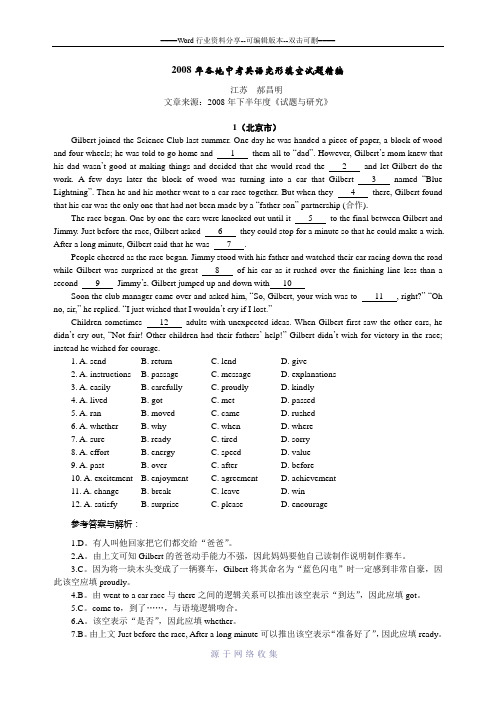
2008年各地中考英语完形填空试题精编江苏郝昌明文章来源:2008年下半年度《试题与研究》1(北京市)Gilbert joined the Science Club last summer. One day he was handed a piece of paper, a block of wood and four wheels; he was told to go home and 1 them all to “dad”. However, Gilbert’s mom knew that his dad wasn’t good at making things and decided that she would read the 2 and let Gilbert do the work. A few days later the block of wood was turning into a car that Gilbert 3 named “Blue Lightning”. Then he and his mother went to a car race together. But when they 4 there, Gilbert found that his car was the only one that had not been made by a “father-son” partnership (合作).The race began. One by one the cars were knocked out until it 5 to the final between Gilbert and Jimmy. Just before the race, Gilbert asked 6 they could stop for a minute so that he could make a wish. After a long minute, Gilbert said that he was 7 .People cheered as the race began. Jimmy stood with his father and watched their car racing down the road while Gilbert was surprised at the great 8 of his car as it rushed over the finishing line less than a second 9 Jimmy’s. Gilbert jumped up and down with 10Soon the club manager came over and asked him, “So, Gilbert, your wish was to 11 , right?”“Oh no, sir,” he replied. “I just wished that I wouldn’t cry if I lost.”Children sometimes 12 adults with unexpected ideas. When Gilbert first saw the other cars, he didn’t cry out, “Not fair! Other children had their fathers’ help!” Gilbert didn’t wish for victory in the race; instead he wished for courage.1. A. send B. return C. lend D. give2. A. instructions B. passage C. message D. explanations3. A. easily B. carefully C. proudly D. kindly4. A. lived B. got C. met D. passed5. A. ran B. moved C. came D. rushed6. A. whether B. why C. when D. where7. A. sure B. ready C. tired D. sorry8. A. effort B. energy C. speed D. value9. A. past B. over C. after D. before10. A. excitement B. enjoyment C. agreement D. achievement11. A. change B. break C. leave D. win12. A. satisfy B. surprise C. please D. encourage参考答案与解析:1.D。
2008 完型汇总
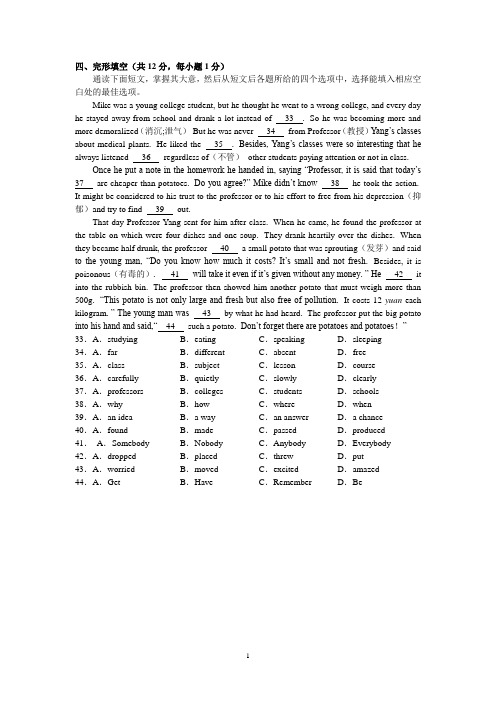
四、完形填空(共12分,每小题1分)通读下面短文,掌握其大意,然后从短文后各题所给的四个选项中,选择能填入相应空白处的最佳选项。
Mike was a young college student, but he thought he went to a wrong college, and every day he stayed away from school and drank a lot instead of 33 . So he was becoming more and more demoralized(消沉;泄气)But he was never 34 from Professor(教授)Y ang’s classes about medical plants.He liked the 35 .Besides, Y ang’s classes were so interesting that he always listened 36 regardless of(不管)other students paying attention or not in class.Once he put a note in the homework he handed in, saying “Professor, it is said that today’s 37 are cheaper than potatoes.Do you agree?” Mike didn’t know 38 he took the action. It might be considered to his trust to the professor or to his effort to free from his depression(抑郁)and try to find 39 out.That day Professor Y ang sent for him after class. When he came, he found the professor at the table on which were four dishes and one soup. They drank heartily over the dishes.When they became half drunk, the professor 40 a small potato that was sprouting(发芽)and said to the young man, “Do you know how much it costs? It’s small and not fresh.Besides, it is poisonous(有毒的).41 will take it even if it’s given without any money.” He 42 it into the rubbish bin. The professor then showed him another potato that must weigh more than 500g.“This potato is not only large and fresh but also free of pollution. It costs 12 yuan each kilogram.” The young man was 43 by what he had heard. The professor put the big potato into his hand and said,“44 such a potato.Don’t forget there are potatoes and potatoes!”33.A.studying B.eating C.speaking D.sleeping 34.A.far B.different C.absent D.free 35.A.class B.subject C.lesson D.course 36.A.carefully B.quietly C.slowly D.clearly 37.A.professors B.colleges C.students D.schools 38.A.why B.how C.where D.when39.A.an idea B.a way C.an answer D.a chance 40.A.found B.made C.passed D.produced 41.A.Somebody B.Nobody C.Anybody D.Everybody 42.A.dropped B.placed C.threw D.put 43.A.worried B.moved C.excited D.amazed 44.A.Get B.Have C.Remember D.BeThe Need T o Give UpTwo friends visited a zoo together. The zoo was very 33 and it was impossible to go everywhere. They had to 34 where and which animal to visit as their time was limited(限定). So 35 of them agreed not to go back after choosing a road at every fork.A road sign at the first fork showed one way to the 36 quarters and the other to the tiger hill. They decided on the former after a 37 discussion because lions are “the kings of the forest.” The second 38 a fork going separately to the panda and the peacock. They chose the panda as it is the nation’s treasure, so they 39 its way. Thus they made choices all 40 the way and each choice meant making a decision with some regret, but they had to make their choices quickly.If they couldn’t, they would 41 more.Only rapid decisions could offer more 42 for sightseeing and reduce possible regret.Life is more or less like this—one often has to choose, for example, between two desirable (合意)jobs, two fascinating universities. To get one you have to give up the other—you can 43 get half of it. If you spend time weighing the pros and cons and thinking about gains and losses(得失), you will most likely 44 with empty hands.Don’t be sad about it. At least you have got half of the desirable things in life—something that is hard to come by. 33.A.small B.large C.far D.dirty 34.A.know B.agree C.ask D.decide 35.A.both B.one C.all D.neither 36.A.panda B.bird C.food D.lion 37.A.long B.hard C.short D.serious 38.A.was B.gave C.formed D.talked 39.A.got B.went C.made D.moved 40.A.along B.across C.by D.in41.A.fail B.lose C.miss D.waste 42.A.choices B.chances C.decisions D.discussions 43.A.also B.even C.still D.only 44.A.start B.stop C.end D.changeI was living in New Y ork when my father called. He was working in the city and. suggested we meet for dinner. But more pleasing and surprising to me was the way we had the dinner. For this time he didn’t spend the whole time giving advice I didn’t 33 . He talked with me.I walked him to the bus station. While we were waiting, he stood against the wall. My father had 34 been a strong and heavy man. Now I saw how thin and weak he was. He then told me something that surprised me. He said he still 35 , inside his head, like a young man, and couldn’t believe he’d passed sixty.“Y ou don’t know, at your age, how fast time goes,” he said.“If I never really talked with you boys as much as I’d have liked to, it was because there was so little time and so much I ha d to teach you.I just didn’t want you to make all the mistakes I had made. I wanted to 36 you from some of the troubles I had.”I wanted to say, “Thank you, Dad, for telling me that.” I knew at last I was a 37 to my father. We could talk with each other. But I was too 38 by the evening to say how I was feeling.It was the last 39 we ever had.I was in Florida on a business trip when I 40 home. Dad had a stroke(中风)last night, after coming home from work.He’d always said he wanted to wor k till the day he died. He got his wish. My wish, for another talk with my father, would go unfulfilled(未完成的).I now know things I didn’t know 41 my father was alive.Time does go really fast. There is so much to teach my boy and so little time: I’ve 42 him change from baby to child to boy in less time certainly than I took. I know the temptation(引诱)always to be telling him things, the things he’ll 43 to survive(生存), to be a good person.But I remember my father’s final lesson. My boy will learn by what I am and what I do far more than by what I tell him.When Eric, aged eight, says, “Dad, can we talk?” I 44 my book and say, “Sure.” I think for a second he wants my advice about something, but then I remember.He doesn’t want advice. He just wants to talk.33.A.want B.follow C.understand D.know 34.A.once B.just C.often D.sometimes 35.A.thought B.looked C.wished D.felt 36.A.avoid B.save C.help D.pull 37.A.man B.boy C.son D.friend 38.A.nervous B.excited C.thankful D.frightened 39.A.chance B.word C.conversation D.dinner 40.A.arrived B.went C.called D.missed 41.A.when B.what C.though D.because 42.A.noticed B.seen C.made D.watched 43.A.have B.need C.get D.try44.A.look at B.hold up C.put down D.take outWhen I was in the seventh grade, I worked at a local hospital in my town. I volunteered about thirty to forty hours a week during the summer.Most of the time I spent there was with Mr. Gillespie.He never had any 33 , and nobody seemed to care about his condition.I spent many days there 34 his hand and talking to him, helping with anything that needed to be done. He became a close friend of mine, even though he replied to me with only a very gentle moving of his fingers. Mr. Gillespie was still in a coma(昏迷).I left for a week to vacation with my parents, and when I came back, Mr.Gillespie was 35 I didn’t have the courage to ask any of the nurses where he was, for fear they might tell me he had died.So with many questions unanswered, I continued to volunteer there through my eighth-grade year.Several years later, when I was a junior in high school, I was at the gas station when I noticed a 36 face. When I realized who it was, my eyes were filled with 37 He was alive! I asked him if his name was Mr. Gillespie, and if he had been in a coma about five years ago. With an 38 look on his face, he replied, “Y es.” I explained how I knew him, and that I had spent many hours talking with him in the hospital. With tears in his eyes, he gave me the warmest hug (拥抱)I had 39 received.He began to tell me how, as he 40 there comatose, he could hear me talking to him and could feel me holding his hand the whole time. He thought it was an angel, not a person, who was there with him. Mr. Gillespie firmly believed that it was my voice and touch that had kept him 41 .Then he told me about his 42 and what happened to him to put him in the coma. We both cried for a while and exchanged a hug, said our goodbyes and went our separate ways.Although I haven’t seen him since then, he 43 my heart with joy every day.I know that I made a difference between his life and his death.More important, he has made a great difference in 44 life. I will never forget him and what he did for me:he made me an angel. 33.A.questions B.visitors C.examinations D.friends 34.A.washing B.clapping C.holding D.waving 35.A.gone B.lost C.dead D.missed 36.A.strange B.familiar C.special D.exciting 37.A.shine B.joy C.tears D.excitement 38.A.angry B.uncertain C.pleased D.frightened 39.A.almost B.even C.never D.ever 40.A.lived B.lay C.slept D.laid 41.A.healthy B.awake C.alive D.asleep 42.A.job B.life C.family D.friends 43.A.moves B.encourages C.fills D.completes 44.A.their B.his C.our D.my It was a cold morning, and Eduardo Ortega received a large envelope(信封). In it was his dream. But he was too nervous to __33__ it.He put the envelope into his __34__ and caught the school bus.Eduardo arrived at __35___with the envelope. He walked past his classmates and sat down in the school library. He took a deep breath drew the envelope out of his pocket and carefully opened it. A s he read the words, "Congratulations …__36 have been accepted," he was already in tears.He remembered the long hours working in the fields, picking strawberries and beans. During those years, Eduardo was much more than a child __37__. After work every day, his tired friends drank coffee or slept. Eduardo went to the evening school. He studied, read, and wrote poems and short stories. Although he __38 many classes, he became the best student.When he was thirteen, Eduardo __39 one of his dreams —to fly on an airplane for the first time. He wrote a poem that won a prize — a trip to San Francisco. As he flew, he promised himself to become a pilot. He loved to__40 .Even though Eduardo worked to help his family, his father __41__ encouraged him to go to school. So, while he worked, he also studied. Many days, he thought it was __42__, too tired to read his books. But his father just smiled and told him he could __43 it.So, now, Eduardo knew his dream of becoming a pilot was not __44__. He knew that it was his father's dream, too. He would soon become a pilot, flying every day to all the exciting places in the world.33. A. open B. know C. answer D. write34. A. car B. mailbox C. desk D. pocket35. A. home B. school C. the airport D. the post office36. A. I B. we C. you D. they37.A. worker B. writer C. waiter D. pilot38. A. watched B. missed C. took D. left39.A. wanted B. found C. realized D. thought40. A. fly B. jump C. study D. work41. A. also B. still C. sometimes D. always42. A. careless B. hopeless C. uninteresting D. unimportant43. A. take B. stop C. make D. work44 A. made B. needed C. given D. lost答案33.A34.C 35.D 36.A37.C38.A39.B 40.D 41.B 42.C 43.B 44.D 45.B 46.C 47.A48.B 49.A。
2008年英语专业四级真题完形填空及答案解析
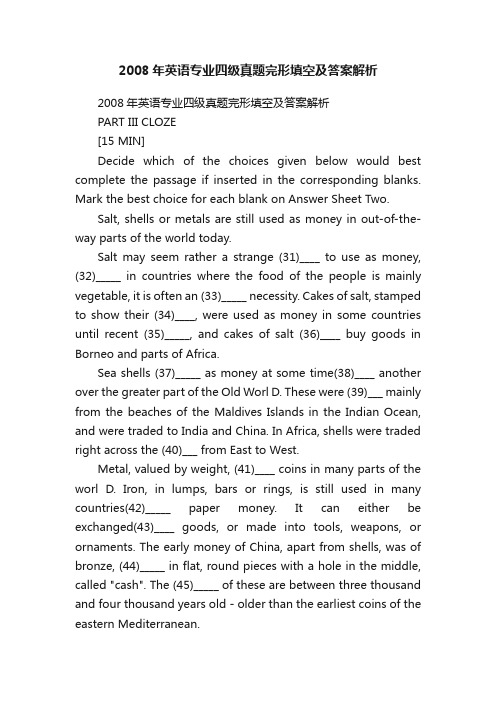
2008年英语专业四级真题完形填空及答案解析2008年英语专业四级真题完形填空及答案解析PART III CLOZE[15 MIN]Decide which of the choices given below would best complete the passage if inserted in the corresponding blanks. Mark the best choice for each blank on Answer Sheet Two.Salt, shells or metals are still used as money in out-of-the-way parts of the world today.Salt may seem rather a strange (31)____ to use as money, (32)_____ in countries where the food of the people is mainly vegetable, it is often an (33)_____ necessity. Cakes of salt, stamped to show their (34)____, were used as money in some countries until recent (35)_____, and cakes of salt (36)____ buy goods in Borneo and parts of Africa.Sea shells (37)_____ as money at some time(38)____ another over the greater part of the Old Worl D. These were (39)___ mainly from the beaches of the Maldives Islands in the Indian Ocean, and were traded to India and China. In Africa, shells were traded right across the (40)___ from East to West.Metal, valued by weight, (41)____ coins in many parts of the worl D. Iron, in lumps, bars or rings, is still used in many countries(42)_____ paper money. It can either be exchanged(43)____ goods, or made into tools, weapons, or ornaments. The early money of China, apart from shells, was of bronze, (44)_____ in flat, round pieces with a hole in the middle, called "cash". The (45)_____ of these are between three thousand and four thousand years old - older than the earliest coins of the eastern Mediterranean.Nowadays, coins and notes have (46)____ nearly all the more picturesque (47)____ of money, and (48)____ in one or two of the more remote countries people still keep it for future use on ceremonial (49)____ such as weddings and funerals, examples of (50)____ money will soon be found only in museums.(31) A. object B. article C. substance D. category(32) A. but B. and C. so D. even(33) A. abstract B. advantageous C. abundant D. absolute(34) A. weight B. value C. role D. size(35) A. times B. events C. situations D. conditions(36) A. even B. also C. still D. never(37) A. had been used B. are used C. would be used D. would have been used(38) A. and B. but C. yet D. or(39) A. collected B. produced C. grown D. raised(40) A. city B. district C. communib D. continent(41) A. processed B. produced C. preceded D. proceeded(42) A. in spite of B. instead of C. along with D. in line with(43) A. against B. as C. in D. for(44) A. often B. seldom C. really D. much(45) A. earlier B.earliest C.better D.best(46) A. replaced B. reproduced C. reflected D. recovered(47) A. sizes B. shapes C. formats D. forms(48) A. while B. although C. because D. if(49) A. events B. gatherings C. occasions D. assemblies(50) A. original B. primitive C. historical D. crudePART III CLOZE答案解析31. C. 句意:盐作为钱大概看起来很奇怪。
08年考研英语完形填空标准答案
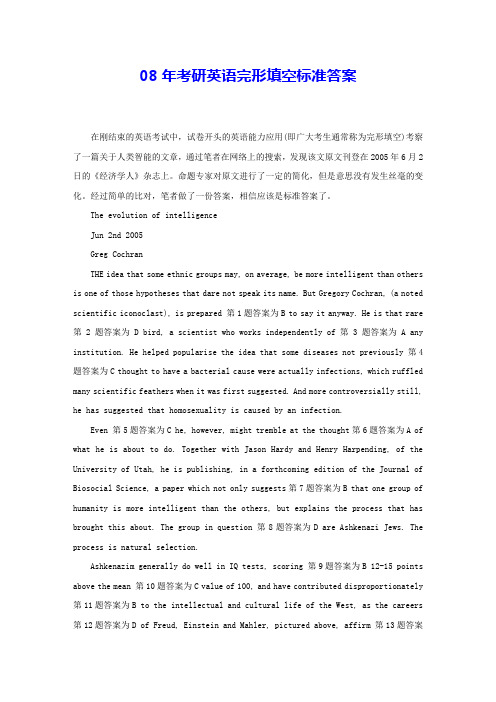
08年考研英语完形填空标准答案在刚结束的英语考试中,试卷开头的英语能力应用(即广大考生通常称为完形填空)考察了一篇关于人类智能的文章,通过笔者在网络上的搜索,发现该文原文刊登在2005年6月2日的《经济学人》杂志上。
命题专家对原文进行了一定的简化,但是意思没有发生丝毫的变化。
经过简单的比对,笔者做了一份答案,相信应该是标准答案了。
The evolution of intelligenceJun 2nd 2005Greg CochranTHE idea that some ethnic groups may, on average, be more intelligent than others is one of those hypotheses that dare not speak its name. But Gregory Cochran, (a noted scientific iconoclast), is prepared 第1题答案为B to say it anyway. He is that rare 第2题答案为D bird, a scientist who works independently of 第3题答案为 A any institution. He helped popularise the idea that some diseases not previously 第4题答案为C thought to have a bacterial cause were actually infections, which ruffled many scientific feathers when it was first suggested. And more controversially still, he has suggested that homosexuality is caused by an infection.Even 第5题答案为C he, however, might tremble at the thought第6题答案为A of what he is about to do. Together with Jason Hardy and Henry Harpending, of the University of Utah, he is publishing, in a forthcoming edition of the Journal of Biosocial Science, a paper which not only suggests第7题答案为B that one group of humanity is more intelligent than the others, but explains the process that has brought this about. The group in question 第8题答案为D are Ashkenazi Jews. The process is natural selection.Ashkenazim generally do well in IQ tests, scoring 第9题答案为B 12-15 points above the mean 第10题答案为C value of 100, and have contributed disproportionately 第11题答案为B to the intellectual and cultural life of the West, as the careers 第12题答案为D of Freud, Einstein and Mahler, pictured above, affirm 第13题答案为A. They also suffer more often than most people from a number of nasty genetic diseases, such as Tay-Sachs and breast cancer. These facts, however 第14题答案为C, have previously been thought unrelated. The former has been put down 第15题答案为D to social effects, such as a strong tradition of valuing 第16题答案为D education. The latter was seen as a consequence 第17题答案为C of genetic isolation. Even now, Ashkenazim tend to marry among themselves. In the past they did so almost exclusively.Dr Cochran, however, suspects that the intelligence and the diseases are intimately linked 第18题答案为A. His argument is that the unusual history of the Ashkenazim has subjected 第19题答案为B them to unique evolutionary pressures that have resulted in this paradoxical 第20题答案为A state of affairs.。
2008年考研英语完形真题及答案解析(一)
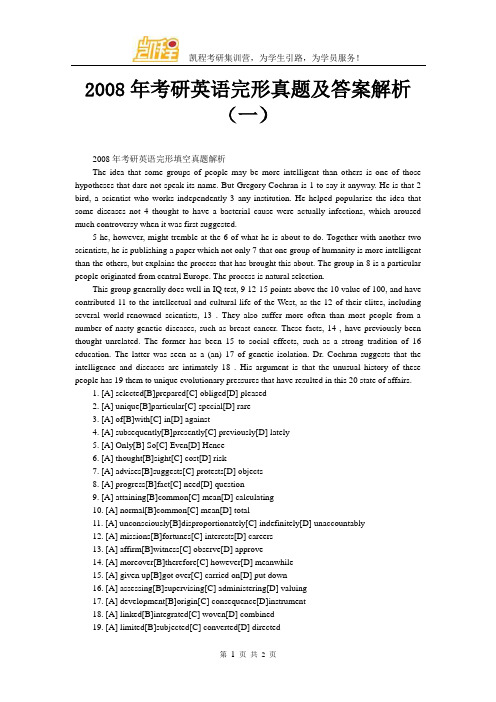
Together with another two scientists, he is publishing a paper which not only 7 that one group of humanity is more intelligent than the others, but explains the process that has brought this about.(分述)
5. [A] Only[B] So[C] Even[D] Hence
6. [A] thought[B]sight[C] cost[D] risk
7. [A] advises[B]suggests[C] protests[D] objects
8. [A] progress[B]fact[C] need[D] question
第三段:
This group generally does well in IQ test…
They also suffer more often than most people from a number of nasty genetic diseases…
His argument is that the unusual history of these people has 19 them to unique evolutionary pressures that have resulted in this 20 state of affairs.(结论)
16. [A] assessing[B]supervising[C] administering[D] valuing
17. [A] development[B]origin[C] consequence[D]instrument
2008全国1卷 完形填空
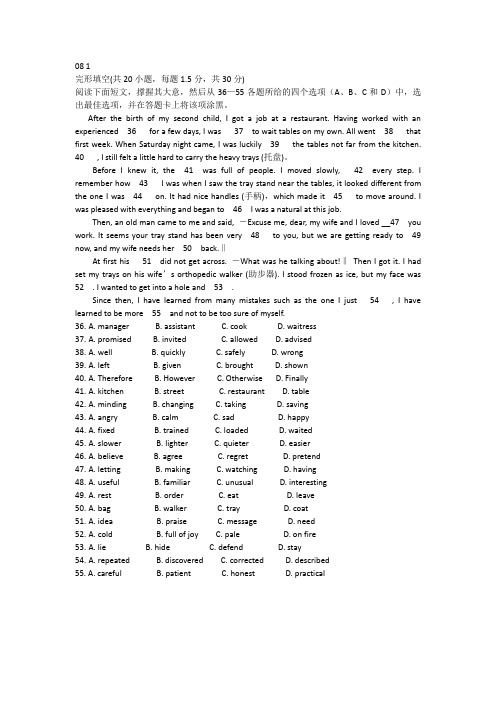
08 1完形填空(共20小题,每题1.5分,共30分)阅读下面短文,撑握其大意,然后从36—55各题所给的四个选项(A、B、C和D)中,选出最佳选项,并在答题卡上将该项涂黑。
After the birth of my second child, I got a job at a restaurant. Having worked with an experienced 36 for a few days, I was 37 to wait tables on my own. All went 38 that first week. When Saturday night came, I was luckily 39 the tables not far from the kitchen. 40 , I still felt a little hard to carry the heavy trays (托盘)。
Before I knew it, the 41 was full of people. I moved slowly, 42 every step. I remember how 43 I was when I saw the tray stand near the tables, it looked different from the one I was 44 on. It had nice handles (手柄),which made it 45 to move around. I was pleased with everything and began to 46 I was a natural at this job.Then, an old man came to me and said, ―Excuse me, dear, my wife and I loved __47 you work. It seems your tray stand has been very 48 to you, but we are getting ready to 49 now, and my wife needs her 50 back.‖At first his 51 did not get across. ―What was he talking about!‖Then I got it. I had set my trays on his wife’s orthopedic walker (助步器). I stood frozen as ice, but my face was 52 . I wanted to get into a hole and 53 .Since then, I have learned from many mistakes such as the one I just 54 , I have learned to be more 55 and not to be too sure of myself.36.A. manager B. assistant C. cook D. waitress37.A. promised B. invited C. allowed D. advised38.A. well B. quickly C. safely D. wrong39.A. left B. given C. brought D. shown40.A. Therefore B. However C. Otherwise D. Finally41.A. kitchen B. street C. restaurant D. table42.A. minding B. changing C. taking D. saving43.A. angry B. calm C. sad D. happy44.A. fixed B. trained C. loaded D. waited45.A. slower B. lighter C. quieter D. easier46.A. believe B. agree C. regret D. pretend47.A. letting B. making C. watching D. having48.A. useful B. familiar C. unusual D. interesting49.A. rest B. order C. eat D. leave50.A. bag B. walker C. tray D. coat51.A. idea B. praise C. message D. need52.A. cold B. full of joy C. pale D. on fire53.A. lie B. hide C. defend D. stay54.A. repeated B. discovered C. corrected D. described55. A. careful B. patient C. honest D. practical。
2008年高考英语(江苏卷)整理汇编含标准答案
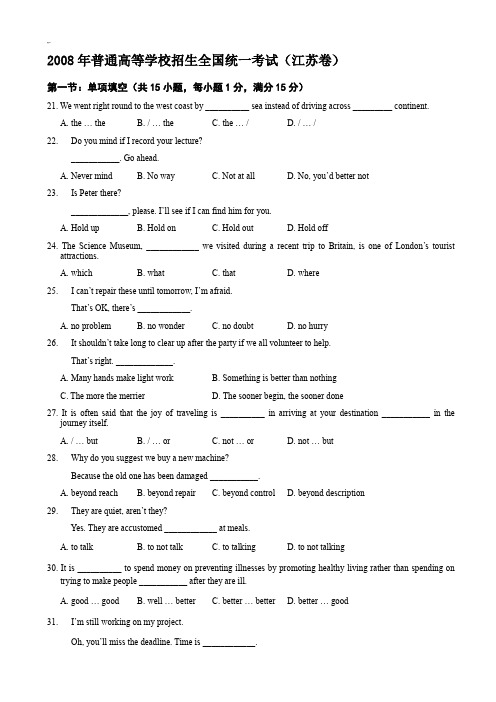
2008年普通高等学校招生全国统一考试(江苏卷)第一节:单项填空(共15小题,每小题1分,满分15分)21. We went right round to the west coast by __________ sea instead of driving across _________ continent.A. the … theB. / … theC. the … /D. / … /22. --- Do you mind if I record your lecture?--- ___________. Go ahead.A. Never mindB. No wayC. Not at allD. No, you’d better not23. --- Is Peter there?--- _____________, please. I’ll see if I can find him for you.A. Hold upB. Hold onC. Hold outD. Hold off24. The Science Museum, ____________ we visited during a recent trip to Britain, is one of London’s touristattractions.A. whichB. whatC. thatD. where25. --- I can’t repair these until tomorrow, I’m afraid.--- That’s OK, there’s ____________.A. no problemB. no wonderC. no doubtD. no hurry26. --- It shouldn’t take long to clear up after the party if we all volunteer to help.--- That’s right. _____________.A. Many hands make light workB. Something is better than nothingC. The more the merrierD. The sooner begin, the sooner done27. It is often said that the joy of traveling is __________ in arriving at your destination ___________ in thejourney itself.A. / … butB. / … orC. not … orD. not … but28. --- Why do you suggest we buy a new machine?--- Because the old one has been damaged ___________.A. beyond reachB. beyond repairC. beyond controlD. beyond description29. --- They are quiet, aren’t they?--- Yes. They are accustomed ____________ at meals.A. to talkB. to not talkC. to talkingD. to not talking30. It is __________ to spend money on preventing illnesses by promoting healthy living rather than spending ontrying to make people ___________ after they are ill.A. good … goodB. well … betterC. better … betterD. better … good31. --- I’m still working on my project.--- Oh, you’ll miss the deadline. Time is ____________.A. running outB. going outC. giving outD. losing out32. __________ you eat the correct foods ___________ be able to keep fit and stay healthy.A. Only if … will youB. Only if … you willC. Unless … will youD. Unless … you will33. --- I’m sure Andrew will win the first prize in the final.--- I think so. He ___________ for it for months.A. is preparingB. was preparingC. had been preparingD. has been preparing34. To learn English well, we should find opportunities to hear English ___________ as much as we can.A. speakB. speakingC. spokenD. to speak35. --- I’m sorry. I ___________ at you the other day.--- Forget it. I was a bit out of control myself.A. shouldn’t shoutB. shouldn’t have shoutedC. mustn’t shoutD. mustn’t have shouted第二节完形填空(共20小题;每小题1分,满分20分)Evelyn Glennie was the first lady of solo percussion in Scotland. In an interview, she recalled how she became a percussion soloist (打击乐器独奏演员) in spite of her disability.“Early on I decided not to allow the 36 of others to stop me from becoming a musician. I grew up on a farm in northeast Scotland and began 37 piano lessons when I was eight. The older I got, the more my passion (酷爱) for music grew. But I also began to gradually lose my 38 . Doctors concluded that the nerve damage was the 39 and by age twelve, I was completely deaf. But my love for music never 40 me.“My 41 was to become a percussion soloist, even though there were none at that time. To perform, I 42 to hear music differently from others. I play in my stocking feet and can 43 the pitch of a note (音调高低) by the vibrations (振动). I feel through my body and through my 44 . My entire sound world exists by making use of almost every 45 that I have.“I was 46 to be assessed as a musician, not as a deaf musician, and I applied to the famous Royal Academy of Music in London. No other deaf student had 47 this before and some teachers 48 my admission. Based on my performance, I was 49 admitted and went to 50 with the academy’s highest honours.“After that, I established myself as the first full-time solo percussionist. I 51 and arranged a lot of musical compositions since 52 had been written specially for solo percussionists.“I have been a soloist for over ten years. 53 the doctor thought a was totally deaf, it didn’t 54 that my passion couldn’t be realized. I would encourage people not to allow themselves to be 55 by others. Follow your passion; follow your heart, they will lead you to the place you want to go.”36. A. conditions B. opinions C. actions D. recommendations37. A. enjoying B. choosing C. taking D. giving38. A. sight B. hearing C. touch D. taste39. A. evidence B. result C. excuse D. cause40. A. left B. excited C. accompanied D. disappointed41. A. purpose B. decision C. promise D. goal42. A. turned B. learned C. used D. ought43. A. tell B. see C. hear D. smell44. A. carefulness B. movement C. imagination D. experience45. A. sense B. effort C. feeling D. idea46. A. dissatisfied B. astonished C. determined D. discouraged47. A. done B. accepted C. advised D. admitted48. A. supported B. followed C. required D. opposed49. A. usually B. finally C. possibly D. hopefully50. A. study B. research C. graduate D. progress51. A. wrote B. translated C. copied D. read52. A. enough B. some C. many D. few53. A. However B. Although C. When D. Since54. A. mean B. seem C. conclude D. say55. A. directed B. guided C. taught D. limited第三部分:阅读理解(共15小题,每题2分,满分30分)AWhat time is it? Most people are pretty accurate in their answer. And if you don’t know for sure, it’s a very likely that you can find out. There may be a watch on your wrist, there may be a clock on the wall, desk, or computer screen; or maybe you’re riding in a car that has a clock in the dashboard (仪表板).Even if you don’t have a timepiece of some sort nearby, your body keeps its own beat. Humans have an internal clock that regulates (调节) the beating of our heart, the pace of our breathing, the discharge (排出) of chemicals within our bloodstream, and many other bodily functions.Time is something from which we can’t escape. Even if we ignore it, it’s still going by, ticking away, second by second, minute by minute, hour by hour. So the main issue in using your time well is, “Who’s in charge?” We can allow time to slip by and let it be our enemy. Or we can take control of it and make it our ally.By taking control of how you spend your time, you’ll increase your chances of becoming a more successfulstudent. Perhaps more importantly, the better you are at managing the time you devote to your studies, the more time you’ll have to spend on your outside interests.The aim of time management is not to schedule every moment so we become slaves of a timetable that governs every waking moment of the day. Instead, the aim is to make informed choices as to how we use our time. Rather than letting the day go by, largely without our awareness, what we are going to discuss next can make us better able to control time for our own purposes.56. The underlined word “ally” in Para. 3 more likely means somebody or something that is _________.A. your slave and serves youB. your supporter and helps youC. under your control and obeys youD. under your influence and follows you57. The author intends to tell us that time _____________.A. could be regulated by a timepiece such as a clock or a watchB. could be managed by the internal clock of human bodiesC. should be well managed for our own interestD. should be saved for outside interests58. In the next part, the author would most probably discuss with you ________.A. how to keep up with the timesB. how to make up for lost timeC. how to have a good timeD. how to make good use of timeBWe experience different forms of the Sun’s energy every day. We can see its light and feel its warmth. The Sun is the major source of evaporation (蒸发) of water from the oceans and lakes. Sunlight also provides the energy used by green plants to make their own food. These green plants then provide food for all organisms (生物) on the Earth.Much of the energy that comes from the Sun never reaches the Earth’s surface. It is either reflected or absorbed by the gases in the upper atmosphere. Of the energy that reaches the lower atmosphere, 30% is reflected by clouds or the Earth’s surface. The remaining 70% warms the surface of the planet, causes water to evaporate, and provides energy for the water cycle and weather. Only a tiny part, approximately 0.023%, is actually used by green plants to produce food.Many gases found in the atmosphere actually reflect heat energy escaping from the Earth’s surface back to the Earth. These gases act like the glass of a greenhouse in that they allow energy from the Sun to enter but prevent energy from leaving. They are therefore called greenhouse gases.When sunlight strikes an object, some of the energy is absorbed and some is reflected. The amount reflected depends on the surface. For example, you’ve probably noticed how bright snow is when sunlight falls on it. Snow reflects most of the energy from the Sun, so it contributes to the low temperatures of winter. Dark-coloured surfaces, such as dark soil or forest, absorb more energy and help warm the surrounding air.59. According to the passage, the root cause for weather changes on the Earth is ______.A. the atmosphere surrounding the EarthB. water from oceans and lakesC. energy from the SunD. greenhouse gases in the sky60. Only a small part of the Sun’s energy reaches the Earth’s surface because most of it _______________.A. absorbed by the clouds in the lower atmosphereB. reflected by the gases in the upper atmosphereC. lost in the upper and lower atmosphereD. used to evaporate water from the oceans and lakes61. We learn from the passage that _______________.A. all living things on the Earth depend on the Sun for their foodB. a forest looks dark in winter because it absorbs solar energyC. only 0.023% of the energy from the Sun is made use of on the EarthD. greenhouse gases allow heat energy to escape from the Earth’s surfaceC62. When people come to visit the Gallery, they should ____________.A. leave all their carried items at the checkroomsB. have all their carried items x-rayed at the entranceC. take all their carried items with them without inspectionD. have all their carried items inspected at the entrance63. What does the Gallery feel sorry for?A. Visitors have to keep their valuable items in the checkrooms.B. The size of visitor items allowed into the Gallery is limited.C. It cannot keep oversized visitor items due to limited space.D. Visitor items over 17×26 inches must go through additional checks.64. Parents with small children visiting the Gallery _____________.A. can carry their children in soft front child carriersB. can carry their children on their shouldersC. can carry their children in child carriers worn on the backD. ought to pay if they want to use pushchairs for their children65. Visiting photographers should make sure that __________.A. pictures and videos are allowed for personal use anywhere in the GalleryB. pictures and videos can be taken in some places for personal useC. picture-taking and videoing are totally forbidden in the GalleryD. tripods are allowed except in some special exhibitionsDIt had been some time since Jack had seen the old man. College, carrier, and life itself got in the way. In fact, Jack moved clear across the country in pursuit of the dreams. There, in the rush of his busy life, Jack had little time to think about the past and often no time to spend with his wife and son. He was working on his future, and nothing could stop him.Over the phone, his mother told him, “Mr. Belser died last night. The funeral is Wednesday.” Memories fleshed through his mind like an old newsreel as he sat quietly remembering his childhood days.“Jack, did you hear me?”“Oh, sorry, Mom. Yes, I heard you. it’s been so long since I thought of him. I’m sorry, but I honestly thought he died years ago,” Jack said.“Well, he didn’t forget you. Every time I saw him he’d ask how you were doing. He’d reminisce (回忆) about the many days you spent over ‘his side of the fence’ as he put it, ” Mom told him.“I loved that old house he lived in,” Jack said.“You know, Jack, after your father died, Mr. Belser stepped in to make sure you had a man’s influence in your life,” she said.“He’s the one who taught me carpentry. I wouldn’t be in this business if it weren’t for him. He spent a lot of time teaching me things he thought were important. Mom, I’ll be there for the funeral.” Jack said.Busy as he was, he kept his word. Jack caught the next flight to his hometown. Mr. Belser’s funeral was small and uneventful. He had no children of his own, and most of his relatives had passed away.The night before he had to return home, Jack and his Mom stopped by to see the old house next door one more time, which was exactly as he remembered. Every step held memories. Every picture, every piece of furniture … Jack stopped suddenly.“What’s wrong, Jack?” his Mom asked.“The box is gone,” he said.“What box?” Mom asked.“There was a small gold box that he kept locked on top of his desk. I must have asked him a thousand times what was inside. All he’d ever tell me was ‘the thing I value most’,” Jack said.It was gone. Everything about the house was exactly how Jack remembered it, except for the box. He figured someone from the Belser family had taken it.“Now I’ll never know what was so valuable to him,” Jack said sadly.Returning to his office the next day, he found a package on his desk. The return address caught his attention.“Mr. Harold Belser” it read.Jack tore open the package. There inside was the gold box and an envelope. Jack’s hands shook as he read the note inside,“Upon my death, please forward this box and its contents to Jack Bernett. It’s the thing I valued most in my life.” A small key was taped to the letter. His heart racing, and tears filling his eyes. Jack carefully unlocked the box. There inside he found a beautiful gold pocket watch. Running his fingers slowly over the fine cover, he opened it.Inside he found these words carved: “Jack. Thanks for your time! Harold Belser.”“Oh. My God! This is the thing he valued most …”Jack held the watch for a few minutes, then called his assistant and cleared his appointments for the next two days. “Why?” his assistant asked.“I need some time to spend with my son,” he said.66. Why did Jack think Mr. Belser died years ago?A. College and career prevented him from remembering Mr. Belser.B. Jack was too busy with his business and family to think about Mr. Belser.C. Jack was too busy realizing his dreams to think about Mr. Belser.D. His present busy life washed away his children memories.67. Jack’s mother told him on the phone about Mr. Belser EXCEPT that _________.A. Mr. Belser often asked how Jack was doingB. Mr. Belser’s funeral would take place on WednesdayC. Mr. Belser had asked for Jack’s mailing addressD. Mr. Belser had pleasant memories of their time together68. Why did Belser send Jack his gold watch?A. Because he was grateful for Jack’s time with him.B. Because he had no children or relatives.C. Because he thought he had to keep his word.D. Because Jack had always wanted it during his childhood.69. Why did Jack say he needed some time to spend with his son?A. He was very tired of his work and wanted to have a good rest.B. He had promised to spare more time to stay with his son.C. He had missed his son and his family for days.D. He came to realize the importance of the time with his family.70. Which of the following is the most suitable title for this passage?A. The Good Old TimesB. What He Valued MostC. An Old Gold WatchD. The Lost Childhood Days第四部分:任务型阅读(共10小题,每小题1分,满分10分)请认真阅读下列短文,并根据所读内容在文章后表格中的空格里填入一个最恰当的单词。
2008年考研英语完形填空真题解析-推荐下载
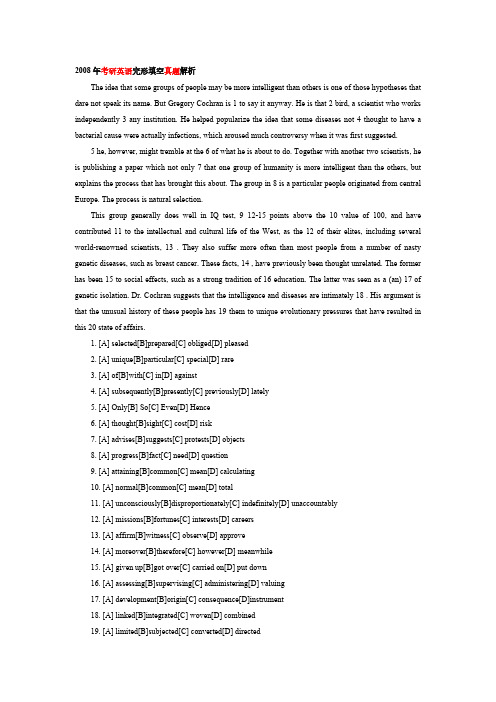
20. [A] paradoxical[B]incompatible[C] inevitable[D] continuous 文章背景 这是一篇介绍个人学术观点的说明文,文章内容主要围绕一部分人是否比另外一部分人聪明这 个主题展开。该文原文刊登在 2005 年 6 月 2 日的《经济学人》杂志上,原文的标题是 The Evolution of Intelligence(智力的进化),命题专家对原文进行了一定的简化,但是意思没有发生丝毫的变化。 文章结构 文章采用了总分的叙述方式,文章第一段的前两句话就是文章叙述的主题,全片文章围绕这个 主题展开。 第一段: The idea that some groups of people may be more intelligent than others is one of those hypotheses that dare not speak its name. But Gregory Cochran is 1 to say it anyway.(总述) 第二段: Together with another two scientists, he is publishing a paper which not only 7 that one group of humanity is more intelligent than the others, but explains the process that has brought this about.(分述) 第三段: This group generally does well in IQ test… They also suffer more often than most people from a number of nasty genetic diseases… His argument is that the unusual history of these people has 19 them to unique evolutionary pressures that have resulted in this 20 state of affairs.(结论) 答案详解 1.【解析】[B] 语义衔接题。本题目选择动词过去分词形式,构成 be…to 的结构,在句子中充 当谓语。 选项 A. selected 选择;B. prepared 准备;C. obliged 迫使,责成;D. pleased 高兴。前边相邻 句子 The idea that some people may be more intelligent than others is one of those hypotheses that dare not speak its name. "一些人比另一些人聪明,这一观点一直是人们不敢明确提出来的假设之一。" 本题所 在句子由 But 一词引导,在句义上与前一句相反,即"打算或准备说了",故选 B。 2.【解析】[D] 语义衔接/词汇辨析题。本题目选择形容词,在句子中充当定语。选项 A. unique 独一无二的;B. particular 特殊的,特别的;C. special 特殊的;D. rare 珍惜的,罕见的,珍贵的。rare birds 意为"稀世珍品,旷世奇才,罕见人(物)", Gregory Cochran 打破常规,准备说了,因此像是" 出头鸟"。 3.【解析】[A] 惯用衔接题。independent 其后应搭配 of,意为"独立于,不依赖于"。还应注意 dependent 后面还可搭配 on,但意为"依赖于, 依靠于"。He is that rare bird, a scientist who works independentlyany institution. "他就是那个稀有之人,是一位不依赖于任何机构的独立的科学家"。 4.【解析】[C] 语义衔接题。本题目选择副词,在句子中充当状语。句子叙述到 He helped popularize the idea that some diseases notthought to have a bacterial cause were actually infections, which ruffled many scientific feathers when it was first suggested. "他普及了这种观点,即某些以前人们认为不 是由细菌引起的疾病实际上是传染病,这一观点一经提出就引起了极大争议。&#料试卷电气设备,在安装过程中以及安装结束后进行高中资料试卷调整试验;通电检查所有设备高中资料电试力卷保相护互装作置用调与试相技互术关,系电通,力1根保过据护管生高线0产中不工资仅艺料可高试以中卷解资配决料置吊试技顶卷术层要是配求指置,机不对组规电在范气进高设行中备继资进电料行保试空护卷载高问与中题带资22负料,荷试而下卷且高总可中体保资配障料置23试时23卷,各调需类控要管试在路验最习;大题对限到设度位备内。进来在行确管调保路整机敷使组设其高过在中程正资1常料中工试,况卷要下安加与全强过,看2度并55工且22作尽2下可护1都能关可地于以缩管正小路常故高工障中作高资;中料对资试于料卷继试连电卷接保破管护坏口进范处行围理整,高核或中对者资定对料值某试,些卷审异弯核常扁与高度校中固对资定图料盒纸试位,卷置编工.写况保复进护杂行层设自防备动腐与处跨装理接置,地高尤线中其弯资要曲料避半试免径卷错标调误高试高等方中,案资要,料求编5试技写、卷术重电保交要气护底设设装。备备4置管高调、动线中试电作敷资高气,设料中课并3技试资件且、术卷料拒管中试试调绝路包验卷试动敷含方技作设线案术,技槽以来术、及避管系免架统不等启必多动要项方高方案中式;资,对料为整试解套卷决启突高动然中过停语程机文中。电高因气中此课资,件料电中试力管卷高壁电中薄气资、设料接备试口进卷不行保严调护等试装问工置题作调,并试合且技理进术利行,用过要管关求线运电敷行力设高保技中护术资装。料置线试做缆卷到敷技准设术确原指灵则导活:。。在对对分于于线调差盒试动处过保,程护当中装不高置同中高电资中压料资回试料路卷试交技卷叉术调时问试,题技应,术采作是用为指金调发属试电隔人机板员一进,变行需压隔要器开在组处事在理前发;掌生同握内一图部线纸故槽资障内料时,、,强设需电备要回制进路造行须厂外同家部时出电切具源断高高习中中题资资电料料源试试,卷卷线试切缆验除敷报从设告而完与采毕相用,关高要技中进术资行资料检料试查,卷和并主检且要测了保处解护理现装。场置设。备高中资料试卷布置情况与有关高中资料试卷电气系统接线等情况,然后根据规范与规程规定,制定设备调试高中资料试卷方案。
2008年考研英语完形填空真题解析
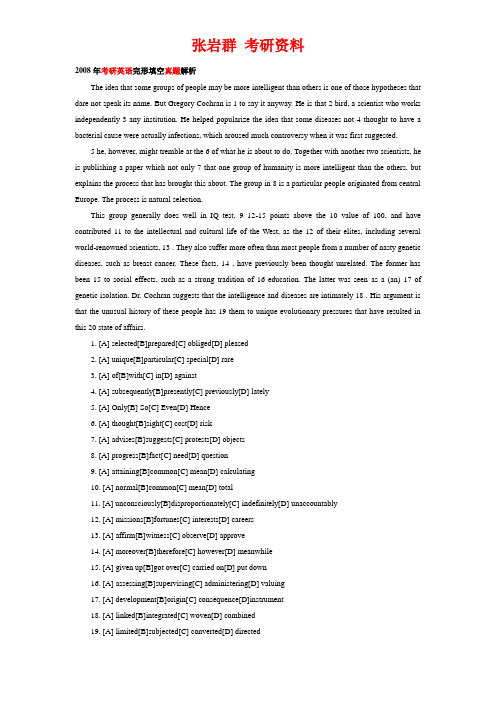
2008年考研英语完形填空真题解析The idea that some groups of people may be more intelligent than others is one of those hypotheses that dare not speak its name. But Gregory Cochran is 1 to say it anyway. He is that 2 bird, a scientist who works independently 3 any institution. He helped popularize the idea that some diseases not 4 thought to have a bacterial cause were actually infections, which aroused much controversy when it was first suggested.5 he, however, might tremble at the6 of what he is about to do. Together with another two scientists, he is publishing a paper which not only7 that one group of humanity is more intelligent than the others, but explains the process that has brought this about. The group in8 is a particular people originated from central Europe. The process is natural selection.This group generally does well in IQ test, 9 12-15 points above the 10 value of 100, and have contributed 11 to the intellectual and cultural life of the West, as the 12 of their elites, including several world-renowned scientists, 13 . They also suffer more often than most people from a number of nasty genetic diseases, such as breast cancer. These facts, 14 , have previously been thought unrelated. The former has been 15 to social effects, such as a strong tradition of 16 education. The latter was seen as a (an) 17 of genetic isolation. Dr. Cochran suggests that the intelligence and diseases are intimately 18 . His argument is that the unusual history of these people has 19 them to unique evolutionary pressures that have resulted in this 20 state of affairs.1. [A] selected[B]prepared[C] obliged[D] pleased2. [A] unique[B]particular[C] special[D] rare3. [A] of[B]with[C] in[D] against4. [A] subsequently[B]presently[C] previously[D] lately5. [A] Only[B] So[C] Even[D] Hence6. [A] thought[B]sight[C] cost[D] risk7. [A] advises[B]suggests[C] protests[D] objects8. [A] progress[B]fact[C] need[D] question9. [A] attaining[B]common[C] mean[D] calculating10. [A] normal[B]common[C] mean[D] total11. [A] unconsciously[B]disproportionately[C] indefinitely[D] unaccountably12. [A] missions[B]fortunes[C] interests[D] careers13. [A] affirm[B]witness[C] observe[D] approve14. [A] moreover[B]therefore[C] however[D] meanwhile15. [A] given up[B]got over[C] carried on[D] put down16. [A] assessing[B]supervising[C] administering[D] valuing17. [A] development[B]origin[C] consequence[D]instrument18. [A] linked[B]integrated[C] woven[D] combined19. [A] limited[B]subjected[C] converted[D] directed20. [A] paradoxical[B]incompatible[C] inevitable[D] continuous文章背景这是一篇介绍个人学术观点的说明文,文章内容主要围绕一部分人是否比另外一部分人聪明这个主题展开。
2008年全国各地高考英语试卷完形填空汇总
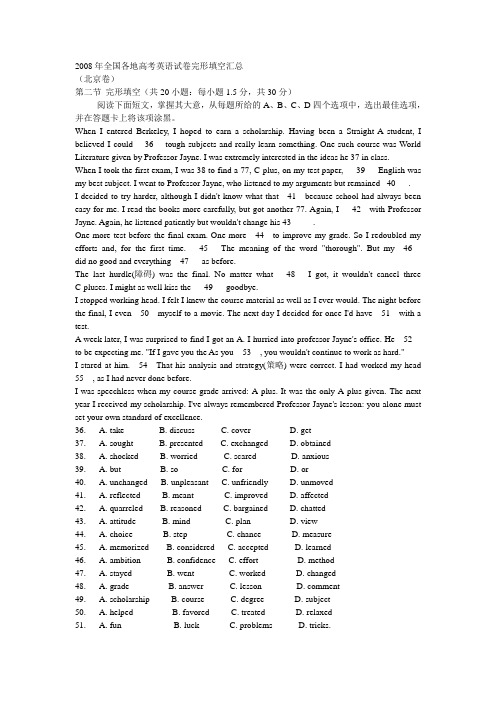
2008年全国各地高考英语试卷完形填空汇总(北京卷)第二节完形填空(共20小题:每小题1.5分,共30分)阅读下面短文,掌握其大意,从每题所给的A、B、C、D四个选项中,选出最佳选项,并在答题卡上将该项涂黑。
When I entered Berkeley, I hoped to earn a scholarship. Having been a Straight-A student, I believed I could __36__ tough subjects and really learn something. One such course was World Literature given by Professor Jayne. I was extremely interested in the ideas he 37 in class.When I took the first exam, I was 38 to find a 77, C-plus, on my test paper, 39 English was my best subject. I went to Professor Jayne, who listened to my arguments but remained_ 40 .I decided to try harder, although I didn't know what that 41 because school had always been easy for me. I read the books more carefully, but got another 77. Again, I 42 with Professor Jayne. Again, he listened patiently but wouldn't change his 43 .One more test before the final exam. One more 44 to improve my grade. So I redoubled my efforts and, for the first time. 45 The meaning of the word "thorough". But my 46__ did no good and everything 47 as before.The last hurdle(障碍) was the final. No matter what 48 I got, it wouldn't cancel three C-pluses. I might as well kiss the 49 goodbye.I stopped working head. I felt I knew the course material as well as I ever would. The night before the final, I even 50 myself to a movie. The next day I decided for once I'd have 51__with a test.A week later, I was surprised to find I got an A. I hurried into professor Jayne's office. He 52__ to be expecting me. "If I gave you the As you 53 , you wouldn't continue to work as hard."I stared at him. 54 That his analysis and strategy(策略) were correct. I had worked my head55 , as I had never done before.I was speechless when my course grade arrived: A-plus. It was the only A-plus given. The next year I received my scholarship. I've always remembered Professor Jayne's lesson: you alone must set your own standard of excellence.36. A. take B. discuss C. cover D. get37. A. sought B. presented C. exchanged D. obtained38. A. shocked B. worried C. scared D. anxious39. A. but B. so C. for D. or40. A. unchanged B. unpleasant C. unfriendly D. unmoved41. A. reflected B. meant C. improved D. affected42. A. quarreled B. reasoned C. bargained D. chatted43. A. attitude B. mind C. plan D. view44. A. choice B. step C. chance D. measure45. A. memorized B. considered C. accepted D. learned46. A. ambition B. confidence C. effort D. method47. A. stayed B. went C. worked D. changed48. A. grade B. answer C. lesson D. comment49. A. scholarship B. course C. degree D. subject50. A. helped B. favored C. treated D. relaxed51. A. fun B. luck C. problems D. tricks.52. A. happened B. proved C. pretended D. seemed53. A. valued B. imagined C. expected D. welcomed54. A. remembering B. guessing C. supposing D. realizing55. A. out B. over C. on D. Off答案:36. A 37. B 38. A 39. C 40. D41. B 42. B 43. B 44. C 45. D46. C 47. B 48. A 49. A 50. C51. A 52. D 53. C 54. D 55. D(安徽卷)第二节完形填空(共20小题;每小题1.5分,满分30分)阅读下面短文,从短文后各题所给的四个选项(A、B、C、D)中,选出可以填入空白处的最佳选项,并在答题卡上将该项涂黑。
2008年中考英语完形填空3篇附解析
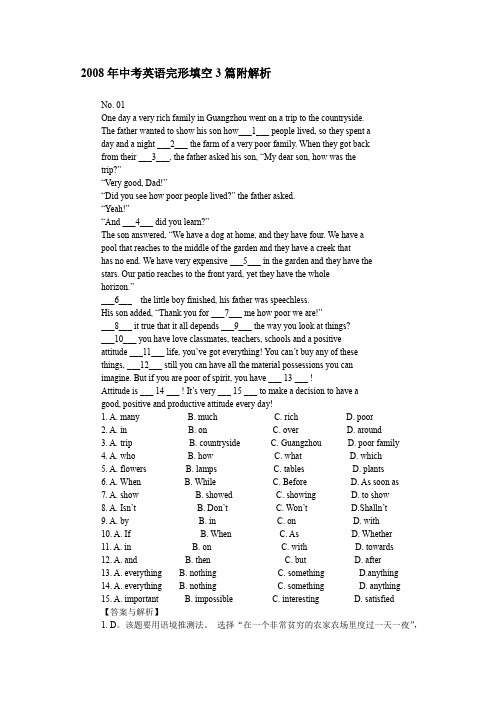
2008年中考英语完形填空3篇附解析No. 01One day a very rich family in Guangzhou went on a trip to the countryside.The father wanted to show his son how___1___ people lived, so they spent aday and a night ___2___ the farm of a very poor family. When they got backfrom their ___3___, the father asked his son, “My dear son, how was thetrip?”“Very good, Dad!”“Did you see how poor people lived?” the father asked.“Yeah!”“And ___4___ did you learn?”The son answered, “We have a dog at home, and they have four. We have apool that reaches to the middle of the garden and they have a creek thathas no end. We have very expensive ___5___ in the garden and they have thestars. Our patio reaches to the front yard, yet they have the wholehorizon.”___6___ the little boy finished, his father was speechless.His son added, “Thank you for ___7___ me how poor we are!”___8___ it true that it all depends ___9___ the way you look at things?___10___ you have love classmates, teachers, schools and a positiveattitude ___11___ life, you’ve got everything! You can’t buy any of thesethings, ___12___ still you can have all the material possessions you canimagine. But if you are poor of spirit, you have ___ 13 ___ !Attitude is ___ 14 ___ ! It’s very ___ 15 ___ to make a decision to have agood, positive and productive attitude every day!1. A. many B. much C. rich D. poor2. A. in B. on C. over D. around3. A. trip B. countryside C. Guangzhou D. poor family4. A. who B. how C. what D. which5. A. flowers B. lamps C. tables D. plants6. A. When B. While C. Before D. As soon as7. A. show B. showed C. showing D. to show8. A. Isn’t B. Don’t C. Won’t D.Shall n’t9. A. by B. in C. on D. with10. A. If B. When C. As D. Whether11. A. in B. on C. with D. towards12. A. and B. then C. but D. after13. A. everything B. nothing C. something D.anything14. A. everything B. nothing C. something D. anything15. A. important B. impossible C. interesting D. satisfied【答案与解析】1. D。
- 1、下载文档前请自行甄别文档内容的完整性,平台不提供额外的编辑、内容补充、找答案等附加服务。
- 2、"仅部分预览"的文档,不可在线预览部分如存在完整性等问题,可反馈申请退款(可完整预览的文档不适用该条件!)。
- 3、如文档侵犯您的权益,请联系客服反馈,我们会尽快为您处理(人工客服工作时间:9:00-18:30)。
2008年全国各地高考英语试卷完形填空汇总(北京卷)When I entered Berkeley, I hoped to earn a scholarship. Having been a Straight-A student, I believed I could __36__ tough subjects and really learn something. One such course was World Literature given by Professor Jayne. I was extremely interested in the ideas he 37 in class.When I took the first exam, I was 38 to find a 77, C-plus, on my test paper, 39 English was my best subject. I went to Professor Jayne, who listened to my arguments but remained_ 40 .I decided to try harder, although I didn‟t know what that41 because school had always been easy for me. I read the books more carefully, but got another 77. Again, I 42 with Professor Jayne. Again, he listened patiently but wouldn‟t change his 43 .One more test before the final exam. One more 44 to improve my grade. So I redoubled my efforts and, for the first time. 45 The meaning of the word “thorough”. But my46__ did no good and everything 47 as before.The last hurdle(障碍) was the final. No matter what 48 I got, it wouldn‟t cancel three C-pluses. I might as well kiss the 49 goodbye.I stopped working head. I felt I knew the course material as well as I ever would. The night before the final, I even 50 myself to a movie. The next day I dec ided for once I‟d have 51__with a test.A week later, I was surprised to find I got an A. I hurried into professor Jayne‟s office. He 52__ to be expecting me. “If I gave you the As you53 , you wouldn‟t continue to work as hard.”I stared at him. 54 That his analysis and strategy(策略) were correct. I had worked my head 55 , as I had never done before.I was speechless when my course grade arrived: A-plus. It was the only A-plus given. The next year I received my scholarship. I‟ve always remembered Professor Jayne‟s lesson: you alone must set your own standard of excellence.36. A. take B. discuss C. cover D. get37. A. sought B. presented C. exchanged D. obtained38. A. shocked B. worried C. scared D. anxious39. A. but B. so C. for D. or40. A. unchanged B. unpleasant C. unfriendly D. unmoved41. A. reflected B. meant C. improved D. affected42. A. quarreled B. reasoned C. bargained D. chatted43. A. attitude B. mind C. plan D. view44. A. choice B. step C. chance D. measure45. A. memorized B. considered C. accepted D. learned46. A. ambition B. confidence C. effort D. method47. A. stayed B. went C. worked D. changed48. A. grade B. answer C. lesson D. comment49. A. scholarship B. course C. degree D. subject50. A. helped B. favored C. treated D. relaxed51. A. fun B. luck C. problems D. tricks.52. A. happened B. proved C. pretended D. seemed53. A. valued B. imagined C. expected D. welcomed54. A. remembering B. guessing C. supposing D. realizing55. A. out B. over C. on D. Off答案:36. A 37. B 38. A 39. C 40. D41. B 42. B 43. B 44. C 45. D46. C 47. B 48. A 49. A 50. C51. A 52. D 53. C 54. D 55. D(安徽卷)第二节完形填空(共20小题;每小题1.5分,满分30分)阅读下面短文,从短文后各题所给的四个选项(A、B、C、D)中,选出可以填入空白处的最佳选项,并在答题卡上将该项涂黑。
There are many different ways of seeing a town for the first time. One of them is to walk around it, guide-book 36 hand. Of course, we may 37 with our guide-books the history and 38 developments of a town and get to know them. 39 then, if we take out time and 40 in a town for a while, we may get to know it better. When we 41 it as a whole, we begin to have some 42 ,which even the best guide-books do not answer. Why is the town just 43 this, this shape, this plan, this size? Why do its streets 44 in this particular way, and not in any 45 why?Here even the best guide-book 46 us. One can‟t find in it the information about how a town has developed to the 47 appearance. It may not describe the original (最初的) 48 of a town. However, one may get some idea of what I 49 look like by walking around the town. One can also imagine 50 the town was first planned and . Then one can learn more about in what direction the town 51 to develop.What is the 52 of studying towns in the way? For me, it is 53 that one gets a greater depth of pleasure by visiting and seeing a town with one‟s own eyes. A 54 visit to a town may help one better understand why it is attractive 55 just reading about it in a guide-book.36. A. in B. C. by D. on37. A. write B. study C. tell D. remember38. A. strange B. similar C. separate D. special39. A. But B. Before C. Since D. Until40. A. B. work C. stay D.41. A. look at B. look after C. look for D. look up42. A. ideas B. opinions C. feelings D. questions43. A. of B. for C. like D.44. A. open B. C. begin D. move45. A. one B. more C. other D. such46. A. helps B. tricks C. fails D.47. A. old B. C. first D. present48. A. capital B. meaning C. design D. change49. A. used to B. seemed to C. had to D. happened to50. A. what B. how C. when D. where51. A. stops B. appears C. starts D. continues52. A. point B. view C. problem D. difficulty53. A. B. simply C. generally D.54. A. B. formal C. group D. personal55. A. from B. C. through D. With答案:21.B 22.B 23.C 24.D 25.A 26.B 27.A 28.C 29.A 30.B 31.C 32.D33.D 34.A 35.D 36.A 37.B 38.D 39.A 40.C 41.A 42.D 43.C 44.B45.C 46.C 47.D 48.C 49.A 50.B 51.D 52.A 53.B 54.D 55.B(福建卷)第二节完形填空(共20小题:每小题1.5分,满分30分)阅读下面短文,从短文后所给各题的四个选项(A、B、C和D)中,选出可以填入空白处的最佳选项,并在答题卡上将该项涂黑。
